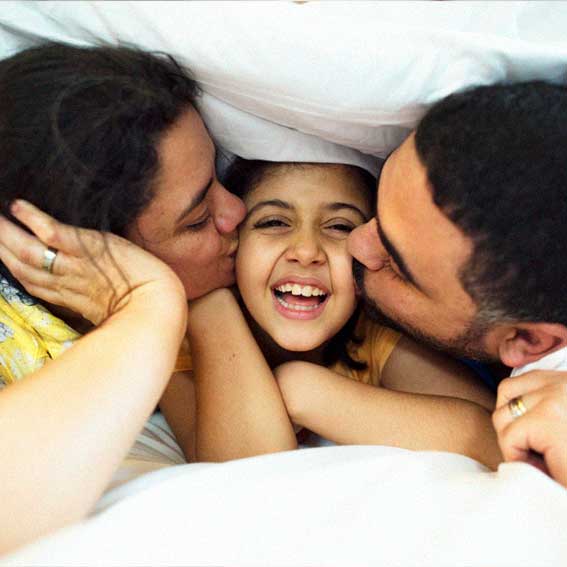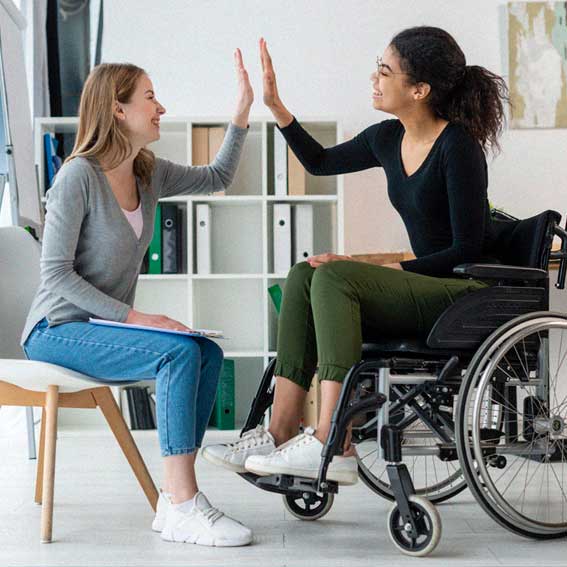Programs
Children and Family:
Our children and family counseling programs are designed to enhance individual and family strengths in order to achieve improvements in behavior, relationships, and/or emotional wellbeing. We provide high quality counseling services to children, adolescents and families who are coping with a wide range of issues – from relatively simple behavior and adjustment problems to more serious. conditions of depression, anxiety, child abuse, and trauma. Services are provided in the family’s home, the child’s school, or in one of our three outpatient centers. Increasingly – with funding cutbacks and other barriers – our center is one of the few that still offers these essential services to underprivileged and low-income families. Access to high quality counseling services is especially critical for children and adolescents, as proper and timely treatment during childhood often serves to decrease the risk later in life for more serious mental health disorders, relationship problems, school failure, delinquency, and substance abuse.

Adult Mental Health:
Treats the whole patient, providing a holistic and integrated approach with advanced evidence-based mental health treatment, designed for our patients at their stage of life. Our services are consumer-centered and evidence-based. We work to build a foundation in hope, supportive relationships, a sense of personal empowerment, social inclusion, coping skills, and meaning in their lives.

Psychosocial Rehabilitation Program (PSR):
PSR is guided by the basic philosophy of rehabilitation which holds that people with disabilities need opportunities to identify and choose for themselves their desired roles in the community with regards to living, learning, working and/or participating in social environments. IBH PSR Program focuses on three main areas of recovery: basic living skills development, psychosocial skills training, and therapeutic socialization. Our classes offer support in acquiring basic skills crucial to mental health recovery and personal empowerment. We also offer educational classes that address topics such as building self-esteem, problem solving, healthy boundary setting, learning about one’s diagnosis, stress reduction, increasing self-confidence, wellness and recovery & resiliency.

Psychiatric:
Integrity Behavioral Health provides psychiatric services to groups usually experience severe emotional disturbance and/or severe persistent mental illness. We provide psychiatric services to children and adults, through consultation and treatment from psychiatric doctors and NP’s . Integrity Behavioral Health Psychiatric Services is committed to providing accessible, comprehensive, high-quality mental health, and substance abuse services to all persons with dignity and respect at an affordable price.

Substance Abuse:
Chemical Dependency is a primary, progressive, chronic and potentially fatal disease that produces negative consequences on those who use and the family members who love them. Integrity Behavioral Health, LLC., Intensive Outpatient Program is a comprehensive treatment program that aids adults, adolescents and their families through the early recovery stages of chemical dependency. The program’s format allows us to teach within a less restrictive environment, while still developing the individual’s necessary skills to lead a drug and alcohol-free life. The outpatient program length is between 12-16 weeks and incorporates group, individual and family counseling, along with psychiatric care for those with mental health needs. We have flexible day and evening programs to accommodate work schedules.

Services
Assessments:
- Psychiatric evaluation
- Brief behavioral health status examination
- Psychiatric review of records
- In-depth assessment
- Bio-psychosocial evaluation
- Substance Abuse Assessments
- Psychological testing (TBA)
- Limited functional assessment
- Bounding/ Attachment / Siblings Assessments

Individual:
Individual therapy involves a client meeting one-on-one with a licensed counselor or therapist. Individual therapy can help clients manage their symptoms and learn the coping skills they need. In addiction treatment, individual therapy is often included as part of a dual diagnosis. A dual diagnosis occurs when in addition to a substance abuse problem you also suffer from an underlying mental health condition such as bipolar disorder.

Family:
Family therapy is a type of psychotherapy that assists family members to improve communication and resolve conflicts. Family therapy is often short-term. At Integrity Behavioral Health, it may include all family members or just those able or willing to participate. Your specific treatment will depend on your family’s situation. Family therapy sessions can teach you skills to deepen family connections and get through stressful times, even after you are finished with therapy sessions.

Group:
Group therapy sessions often involve around eight to twelve individuals (although it is possible to have more participants). The group typically meets once each week, for an hour. Group members talk about a variety of issues including exploring relationships, improving self-esteem, and enhancing coping skills. Group members share information about themselves and provide feedback to others while the group counselors facilitate productive communication in the group.

Co-parenting /Extended-Coparenting:
Working together with your ex and with the extended family to productively parent your children together after a relationship ends (often called “co-parenting”) can be a challenge. When divorced parents can parent together respectfully, with low conflict, low hostility, and more cooperation and agreement, kids just do better! They have better overall mental health and higher self-esteem, do better in school, and have fewer behavioral problems. They also tend to have higher-quality relationships with their dads and more involvement with them.

Couples Therapy (Marriage/Partnerships and Committed Relationships):
Our couple therapists use some of the most innovative and creative techniques in the therapy business to help you improve your relationship and get past a rough patch. They can help you understand and overcome the problems that can happen in every relationship, such as anger/rage, depression and anxiety, lack of trust, and all the other problems that can be summed up as Communication Issues.

Divorce Counseling:
Integrity Behavioral Health divorce counselor can guide you through this painful and uncertain time, while providing you with the tools you need to move on in a positive and healthy way. In addition, he/she can teach you how to resume a fulfilling post-divorce life and minimize the impact on your children. He/she can also help you better understand why your relationship failed, so you don’t repeat your mistakes.

Marriage Counseling:
The goal of Integrity Behavioral Health marriage counseling is to address “distressed” marriages. Our Marriage and Family therapists are relationship experts, who can teach you how to effectively communicate with your spouse. They also can teach you and your spouse how to strengthen your conflict resolution skills so small disagreements don’t blow up into catastrophic arguments.

On-Site/Home/School:
Integrity Behavioral Health therapists provide services in the community setting such as homes and schools. These places of services provide those we serve with a more familiar environment that help put individuals in need at ease and improve their chances for success.

Psychiatric Evaluation and Medication Management:
Psychiatric evaluations and medication management, also referred to as Pharmacotherapy has shown to be an effective treatment of some mental / behavioral symptoms and related disorders when used in conjunction with evidenced based psychotherapies. Our Psychiatric provide assessment, discuss treatment recommendations and supervise medication interventions. We have compassionate and skilled physicians who understand that you may have questions and concerns about medication as a treatment modality.

Therapeutic Behavioral On-Site Services (TBOS)
In order to receive TBOS, a recipient must meet one of the following eligibility criteria: Under the age of 2 years and meets one of the following criteria: Exhibiting symptoms of an emotional or behavioral nature that are atypical for the recipient’s age and development that interferes with social interaction and relationship development. Failure to thrive. Ages 2 years through 5 years and meets both of the following criteria: Exhibiting symptoms of an emotional or behavioral nature that are atypical for the recipient’s age and development. Ages 6 years through 17 years and meets one of the following criteria: Have an emotional disturbance. Have a serious emotional disturbance. Have a substance use disorder. Ages 18 years through 20 years, but otherwise meets the criteria for an emotional disturbance or a serious emotional.

Therapeutic and Supervised Visitations:
The purpose of supervised visitations is to enable an ongoing relationship between the non-custodial parent and child by impartially observing their contact in a safe and structure environment. Another purpose of supervised visitations is to allow a safe and educational learning experience for the non-custodial parent. Therapeutic supervised visitation programs, can intervene and correct the behavior, therefore teaching the parent appropriate parenting skills by using a mental health professional. Therapeutic supervised visitations, unlike reunification therapy, does not assist in the long-term goal of achieving a healthy relationship between the non-custodial parent and the child.

Addiction Treatment:
We have the expertise, research and tools to help you or your loved one with a substance abuse problem. For patients in treatment, we first address the primary chemical dependency, including any withdrawal symptoms and co-occurring mental health conditions. Each patient’s individualized treatment and rehab plan consists of individual, group and family therapy along with cognitive and behavioral therapy to help a person recover and return to their life as quickly as possible, armed with addiction education and other tools to promote recovery after treatment.

